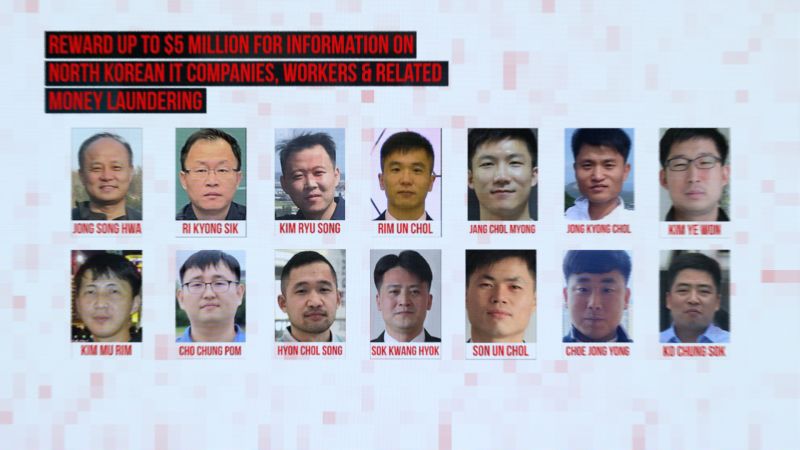LinkedIn Deception: Identifying North Korean Operatives In Your Network

Welcome to your ultimate source for breaking news, trending updates, and in-depth stories from around the world. Whether it's politics, technology, entertainment, sports, or lifestyle, we bring you real-time updates that keep you informed and ahead of the curve.
Our team works tirelessly to ensure you never miss a moment. From the latest developments in global events to the most talked-about topics on social media, our news platform is designed to deliver accurate and timely information, all in one place.
Stay in the know and join thousands of readers who trust us for reliable, up-to-date content. Explore our expertly curated articles and dive deeper into the stories that matter to you. Visit Best Website now and be part of the conversation. Don't miss out on the headlines that shape our world!
Table of Contents
LinkedIn Deception: Identifying North Korean Operatives in Your Network
The professional networking site LinkedIn, a platform designed to connect professionals globally, has become an unlikely battleground in the ongoing geopolitical conflict. Recent investigations have revealed a sophisticated campaign by North Korean operatives to infiltrate LinkedIn, using deceptive profiles to gain access to sensitive information and potentially recruit unwitting collaborators. This article explores the methods used by these operatives and provides crucial tips for identifying and mitigating the risk.
The Growing Threat of North Korean Cyber Espionage
North Korea's state-sponsored hacking groups, often operating under pseudonyms like Lazarus Group and APT38, are notorious for their advanced cyber capabilities. These groups are not just targeting financial institutions; they're increasingly leveraging social engineering techniques to infiltrate organizations and individuals through platforms like LinkedIn. Their motives range from stealing intellectual property to recruiting individuals for illicit activities.
How North Korean Operatives Use LinkedIn for Deception:
-
Fake Profiles: Operatives create meticulously crafted fake profiles, often impersonating legitimate professionals in various industries. These profiles typically include seemingly credible details, such as work history, education, and even connections to real individuals.
-
Targeted Connections: They strategically target individuals working in sectors of interest, such as defense, technology, and finance, focusing on those with access to sensitive information or a high network reach. This targeted approach increases their chances of success.
-
Information Gathering: Once connected, operatives engage in seemingly innocuous conversations, subtly gathering intelligence through casual interactions. They might inquire about projects, technologies, or company strategies, aiming to extract valuable data.
-
Recruitment: In some cases, operatives attempt to recruit individuals for malicious activities, offering attractive opportunities that mask their true intentions. This is a particularly dangerous aspect of their strategy.
Identifying Suspicious LinkedIn Profiles:
Identifying these deceptive profiles requires a discerning eye and a healthy dose of skepticism. Here are some red flags to watch out for:
-
Incomplete or Inconsistent Information: Look for inconsistencies in the profile information. Does the work history align with the claimed education? Are there gaps in employment that are not explained?
-
Limited Connections: A profile with very few connections, especially considering the claimed experience and position, could be a sign of a newly created fake account.
-
Suspicious Activities: Be wary of profiles that suddenly reach out to you with overly friendly or overly professional communication, especially if the subject matter seems out of context.
-
Unusual Profile Photos: Reverse image searches can be helpful in identifying if a profile picture has been used elsewhere, potentially indicating a fake account.
Best Practices for Protecting Yourself on LinkedIn:
-
Be Skeptical: Always maintain a healthy level of skepticism when interacting with new connections on LinkedIn. Don't readily share sensitive information.
-
Verify Information: Cross-reference information provided in profiles with publicly available sources to confirm its authenticity.
-
Review Privacy Settings: Regularly review and adjust your LinkedIn privacy settings to minimize the amount of personal information publicly available.
-
Report Suspicious Activity: If you suspect a profile is fake or malicious, report it to LinkedIn immediately.
Conclusion:
The threat of North Korean operatives using LinkedIn for deceptive purposes is real and growing. By understanding their tactics and employing the strategies outlined above, you can significantly reduce your risk of becoming a victim. Staying vigilant and informed is crucial in navigating this increasingly complex online landscape. Remember, your online security is your responsibility. Learn more about online safety best practices by visiting [link to a relevant cybersecurity resource].

Thank you for visiting our website, your trusted source for the latest updates and in-depth coverage on LinkedIn Deception: Identifying North Korean Operatives In Your Network. We're committed to keeping you informed with timely and accurate information to meet your curiosity and needs.
If you have any questions, suggestions, or feedback, we'd love to hear from you. Your insights are valuable to us and help us improve to serve you better. Feel free to reach out through our contact page.
Don't forget to bookmark our website and check back regularly for the latest headlines and trending topics. See you next time, and thank you for being part of our growing community!
Featured Posts
-
 Jaycee Horns Car Accident Results In Absence From Panthers Browns Joint Practice
Aug 07, 2025
Jaycee Horns Car Accident Results In Absence From Panthers Browns Joint Practice
Aug 07, 2025 -
 Portland Sees Widespread Rain Wednesday Morning Transitioning To Scattered Showers
Aug 07, 2025
Portland Sees Widespread Rain Wednesday Morning Transitioning To Scattered Showers
Aug 07, 2025 -
 Panthers Brian Burns Out Of Practice Car Accident Reported
Aug 07, 2025
Panthers Brian Burns Out Of Practice Car Accident Reported
Aug 07, 2025 -
 Fatal M6 Crash Daniel Burbas Cocaine Use Results In Prison Sentence
Aug 07, 2025
Fatal M6 Crash Daniel Burbas Cocaine Use Results In Prison Sentence
Aug 07, 2025 -
 Rape Accusations Against Thomas Partey Bail Granted Case Continues
Aug 07, 2025
Rape Accusations Against Thomas Partey Bail Granted Case Continues
Aug 07, 2025
Latest Posts
-
 Ucla Research Funding Frozen Federal Government Halts Over 500 Million
Aug 07, 2025
Ucla Research Funding Frozen Federal Government Halts Over 500 Million
Aug 07, 2025 -
 Details Emerge In Erica Banks Theft Charge Arrest
Aug 07, 2025
Details Emerge In Erica Banks Theft Charge Arrest
Aug 07, 2025 -
 Federal Freeze Impacts Ucla Half Billion Dollars In Research Funds Suspended
Aug 07, 2025
Federal Freeze Impacts Ucla Half Billion Dollars In Research Funds Suspended
Aug 07, 2025 -
 Erica Banks Released Hours After Theft Arrest
Aug 07, 2025
Erica Banks Released Hours After Theft Arrest
Aug 07, 2025 -
 Steelers Add Former Bengals Qb Logan Woodside To Roster
Aug 07, 2025
Steelers Add Former Bengals Qb Logan Woodside To Roster
Aug 07, 2025
